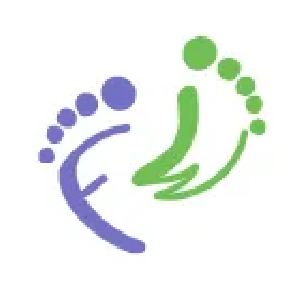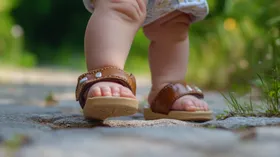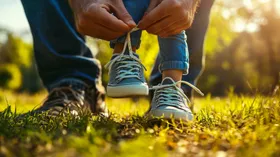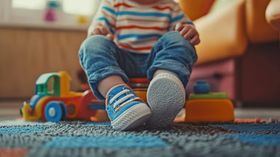Flat Feet (Fallen Arches): Symptoms, Exercises, and Treatment for Kids
Updated December 10, 2024.

The "flat feet" medical term describes a common condition among adults and children alike.
To put it plainly, it's where your feet press flat on the ground instead of curving upwards off the ground at the sole.
Because it's usually painless, a lot of people don't even realise they have it. However, if you suspect your child has flat feet and it's causing issues, the good news is that there are treatment options available.
What is 'Flat Feet'?
Flat feet can also be referred to as "fallen arches" or "collapsed arches." According to Healthline, it can affect up to 30 per cent of the population and produce symptoms in 1 in 10 people.
Both feet are typically affected, but you may only have a collapsed arch in one foot.
You can tell if your child has flat feet by asking them to stand up and looking in a full-length mirror. The arches on the inside of their feet should not touch the floor. If they do, they may have flat feet.
What Causes Flat Feet?
Flat feet can leave you scratching your head, mainly because there's no apparent cause for them.
Sometimes they run in families. In rarer circumstances, flat feet can be caused by:
- The tissues in the feet becoming stretched, as a result of an injury, being overweight, or getting older
- The bones in the feet not growing correctly in the womb
- Other conditions, such as those that affect the nerves, joints, or muscles in the entire body
- Flat feet can also occur when the arches fail to develop during childhood.
What Are Some Flat Feet Symptoms?
Usually, flat feet don't provide any symptoms, and the individual can live an everyday life whether or not they know that they have the condition.
On the other hand, they may experience typical flat foot symptoms such as:
- Feet that tire easily
- Achy feet in the arches and heels
- Swelling at the inside bottoms of the feet
- Difficulty standing on the toes or moving the feet
- Back and leg pain
Proper pronation of foot or ankle pronation is needed to support the natural movement of the feet during landing while walking or running.
What does this mean? Well, flat feet can occasionally cause a condition called overpronation, where the ankles roll inward while you're moving, leading to foot and ankle pain.
And because the feet essentially support your entire body, having flat feet and overpronation can cause problems with spinal alignment.
How to Fix Flat Feet
Flat feet in children typically last until they're around six years of age. If your child has the condition, but they're not experiencing any flat foot pain, or it's not stopping them from going about their daily activities, you don't need to do anything. If they often get feet or ankle injuries or struggle with walking and balance, they may need flat feet treatment.
Flat Feet Therapy
How to help flat feet? Well, your doctor may suggest:
- Arch support shoe inserts. You can buy over-the-counter arch support insoles that mould to the contours of the feet to relieve flat feet pain.
- Flat foot shoes. You can buy comfortable shoes with structural support that are designed specifically for those with non-arched feet.
- Weight loss. Losing weight may reduce the stress on your little one's feet.
- Enough rest. Opt for low-impact activities, like walking, swimming, and biking, rather than high-impact running and jumping.
- Foot massage mats. A Foot massage mat is an excellent way for your kid to receive additional foot stimulation. These mats usually have many small bumps, spikes, and textured surfaces. The main benefit is that the foot's interaction with these textures stimulates connected muscles. That helps with improving arch support by these same muscles in return.
- Stretching exercises. Those who have flat feet can also have a shortened Achilles tendon; therefore, stretching this tendon may help.
Flat Feet Exercises
Speaking of stretching exercises, here are a few that you or your child can do to correct a fallen foot arch and reduce pain:
- Heel stretches. Stand with your hands resting on a chair, wall, or railing at shoulder level. Keep one leg forward and one behind you. Keeping your spine straight, bend your front leg, and push yourself into the wall so you can feel a stretch in your back leg and Achilles tendon. Hold for 30 seconds on each side and repeat four times.
- Tennis ball rolls. Sit up straight on a chair with a tennis ball under your foot. Roll the ball under your foot and focus on the collapsed foot arch. Do this for two minutes before repeating on the opposite foot.
- Arch lifts. Stand with your feet stacked under your hips. Keeping your toes on the floor, roll your weight to the outer edges of your feet while lifting your arches as far as possible. Release the feet. Do two sets of 10-15 repetitions.
Try to do these exercises at least three times per week for the best results.
Challenges with Shoes for Flat Feet
Using orthotics for flat feet can help to alleviate pain, balance the body, and align the spine. They can also reduce the risk of developing ankle, knee, back, and hip problems. But there's another alternative. The next time you're buying kids' shoes, opt for a wide fit with specific heel and arch support for flat feet. Stay away from footwear with a pointed or narrow toe to avoid pressure on the front half of the front and ultimately prevent pain and discomfort. Children with flat feet can benefit from orthopaedic soft-soled shoes that don't just focus on arch support. They also:
- Hug each foot to prevent slippage without being uncomfortably tight
- Provide enhanced support to lessen foot and ankle stress
- Promote proper posture
View our new collection of high-quality orthopaedic shoes that come in a range of kids sizes and styles, from hook and loop closures to quick-drying fabrics and everything in between!
The Takeaway
Flat foot can occur at any age, and it's typically nothing to worry about. If your child is flat-footed, consider investing in shoes for wide feet that will provide the support and comfort they need as they grow into their 'own little person'.





